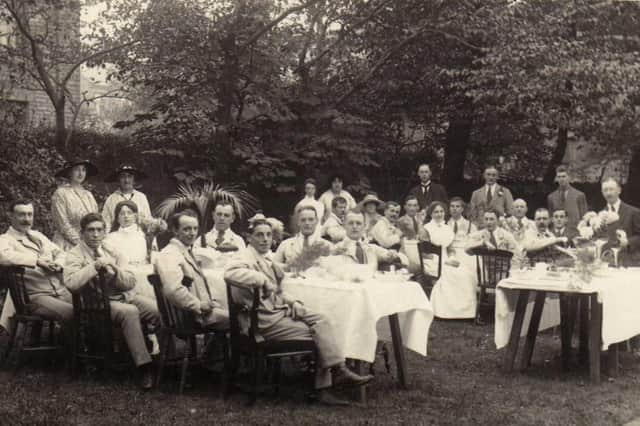Nostalgia with Margaret Watson: Over 1,000 Dewsbury men never returned from World War One


Margaret Watson writes: This was the year when people were able to see for the first time hundreds of wounded soldiers arriving in Dewsbury to be treated at Staincliffe Hospital.
The number became so great that Staincliffe Hospital – the Heavy Woollen District base hospital for wounded soldiers - could no longer cope.
Advertisement
Hide AdAdvertisement
Hide AdLocal church halls and the homes of wealthy businessmen were quickly put at their disposal to be converted into temporary hospitals.
Some of these included St John’s Parochial Hall, Dewsbury Moor, and The Oaklands in Oxford Road, home of the Mayor of Dewsbury, Major P B Walker.
There were emotional scenes at the local railways station with crowds waiting to greet the soldiers as they disembarked, some being carried on stretchers.
The decision was later made for the ambulances not to go through the town centre because of the possible loss of morale it might have caused.
Advertisement
Hide AdAdvertisement
Hide AdInstead the journeys were made at night with the ambulances making a detour along Bradford Road and up through Batley Carr. It was a mournful sight.
Whichever route they took, the people of Dewsbury welcomed them with open arms, and within days of their arrival they were being showered with food, gifts, clothing and cigarettes.
Local concert parties provided entertainment at weekends, and when the soldiers were able to leave their beds, they were given free admission to every place of entertainment in the town.
And there were no shortage of free drinks when they visited local public houses.
Advertisement
Hide AdAdvertisement
Hide AdThey were given a uniform of their own, blue blazers, and a special badge denoting they had been serving in the war but had been honourably discharged through injuries sustained in battle.
This helped distinguish them from young men in the town who had not volunteered to fight for King and Country and were now being regarded as shirkers.
Their distinctive blazers also saved them from the humiliation of being handed white feathers which young girls often gave to able-bodied young men not wearing uniforms.
Conscription had not yet been introduced and the only men fighting in France were professional soldiers and volunteers.
Advertisement
Hide AdAdvertisement
Hide AdThe photograph above shows a group of wounded soldiers attending a garden party in one of the many temporary homes put at their disposal in Dewsbury.
The party was probably in the garden of Oaklands, a substantial and beautiful house Major Walker had donated to be used as a hospital for the duration of the war.
Every provision had been made for their comfort and the house presented a most cosy and comfortable appearance for the 24 soldiers who had been conveyed to Dewsbury by motor bus from Leeds.
Some of the wounded were able to walk unassisted, but the majority limped painfully along and had to be helped.
Advertisement
Hide AdAdvertisement
Hide AdOne tall young soldier, whose head and face were heavily swathed in bandages, attracted the attention and sympathy of the little group of sightseers gathered outside the house.
Once inside, the soldiers sat down to tea, and thanks to the ministrations of numerous willing and cheerful helpers, they quickly seemed to forget their afflictions, and chatted and laughed light-heartedly.
No-one could have foreseen that day that the war everyone thought would be over by Christmas was to last another three years and result in the deaths of millions worldwide.
Something like 10,000 men from Dewsbury fought in the war and over 1,000 never returned.
Advertisement
Hide AdAdvertisement
Hide AdIncredibly, there were a number of parents sent as many as five sons to the battlefields, like Mr and Mrs William Wragg, of Huddersfield Road, Dewsbury.
The Dixon family, of Hanging Heaton also sent five sons, and the Machin family, of Thornhill Lees, sent six sons, three of whom were tragically killed.
Many brothers were in the same regiment and fought side by side and some had harrowing tales to tell.
Private Arthur Secker, of Westtown, was near to his brother, Fred, when he was killed by a shell.
Advertisement
Hide AdAdvertisement
Hide AdIt was his painful duty to write to break the dreadful news to his mother by letter.
He comforted her by writing that her son had died with a smile on his face, for he had been with him.
He wrote that in the heat of battle he only had time to clasp his brother’s hand and say a short prayer before returning himself to the fighting.
Moving stories like this give some insight into the horrors of war and the sacrifices so many families had to make.
Advertisement
Hide AdAdvertisement
Hide AdOther letters published in the Reporter gave graphic details of what was really happening on the front line.
One letter from a young Mirfield soldier, Lance-Corporal Benjamin Barrowclough, speaks from the heart of the horror.
Writing from a dug out on the front line, he writes:
“This is not a war. It is a conglomeration of infernal devices for taking life. Such inhuman slaughter cannot go on indefinitely.
“The ground fairly shakes as the shells burst just behind us. One has to thank his Maker every day that he is still alive.
Advertisement
Hide AdAdvertisement
Hide Ad“It is getting very cold especially at night and we have difficulty keeping warm. Already we have had special orders issued as to the care of feet in regard to frostbite.
“Yesterday the Germans made an attack and one man was killed and four wounded, just outside my dug-out’
Little did local people realise that these horrific events would get far worse the following year when the Battle of the Somme would rage and upwards of 680 men from Dewsbury would be killed.